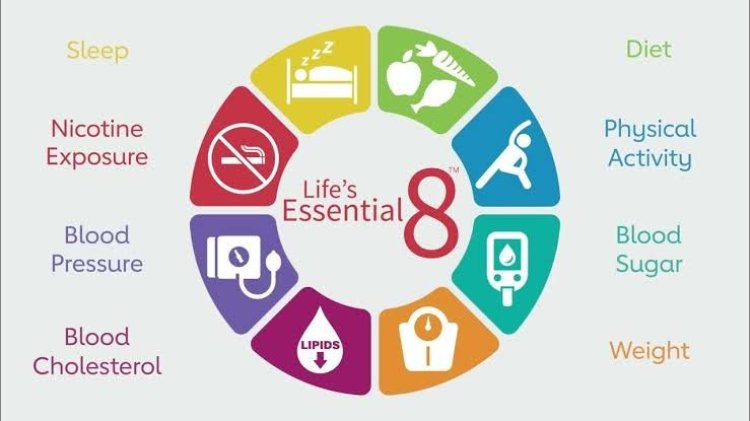FUL Health Corner: Maintaining Healthy, Balanced, Vibrant Lifestyle on Campus by U.H.S.
FUL Health Corner: Maintaining Healthy, Balanced, Vibrant Lifestyle on Campus by U.H.S.

This is to especially welcome all new and returning students to a new academic session at fastest growing University in Nigeria! The Directorate of the University Health Services, also extends a warm, healthy and hearty welcome to each one of our valuable students.
In the exciting journey of higher education, academic success is not only important, but also a healthy and well-balanced life on campus.
As part of the managements vision of ensuring a healthy university community that promotes learning and development, the Directorate of University Health Services is pleased to inform all of the commencement of the FUL Health Corner to educate students and the university community on vital health principles and how to maintain a vibrant and healthy lifestyle. This maiden article will focus on definitions and importance of a healthy life on campus.
What is a health student life?
A healthy student life refers to a well-balanced and holistic approach to the overall well-being of individuals pursuing education. It encompasses physical, mental, and social dimensions, emphasizing habits and practices that contribute to optimal health and positive personal development.
A healthy student life is one that encompasses physical, mental, and social well-being, creating a harmonious balance between academic responsibilities and personal development. Physically, it involves maintaining an active lifestyle through regular exercise, nutritious eating habits, and sufficient sleep. Engaging in physical activities not only promotes fitness but also contributes to heightened energy levels, improved mood, and enhanced cognitive function, all of which are essential for academic success.
Factors That Influence Student Health
Student health is influenced by a variety of factors, including physical, mental, and social dimensions. Understanding these factors is crucial for developing effective strategies to support and improve overall student well-being. Here are some key factors that can impact student health:
1. Lifestyle Choices: Dietary choices can lead to nutritional deficiencies, affecting physical health and cognitive function. In addition, lack of exercise contributes to sedentary lifestyles, potentially leading to weight-related issues and overall health concerns.
2. Mental Health: Academic demands, exams, and deadlines can contribute to high levels of stress, impacting mental health. Furthermore, social expectations, peer relationships, and the challenges of transitioning to university life can influence mental well-being.
3. Sleep Habits: Inconsistent or insufficient sleep patterns can negatively affect cognitive function, mood, and overall physical health.
4. Access to Healthcare: Limited access to healthcare services can hinder early detection and management of health issues, both physical and mental.
5. Financial Constraints: Financial stressors, including the cost of education and living expenses, can impact a student's ability to afford healthy food, healthcare, and recreational activities.
6. Environment: Living conditions, exposure to environmental toxins, and the overall safety of the living environment can affect physical health.
7. Substance Use: Alcohol and substance abuse can have detrimental effects on physical and mental health, as well as academic performance.
9. Technology Use: Excessive use of technology, including social media and screen time, can impact sleep patterns, mental health, and overall well-being.
10. Pre-existing Health Conditions: Individuals with pre-existing health conditions may face additional challenges in managing their health while navigating the demands of academic life.
How Develop and Maintain a Healthy Student Life
1. Prioritizing Physical Wellness: A healthy body is the foundation for a successful academic journey. Engage in regular physical activity to boost energy levels, enhance mood, and improve overall well-being. The University has a sports unit which can help to find the right group exercise classes, or participate in intramural sports. Physical wellness contributes not only to a strong body but also to a focused and alert mind.
2. Nourishing the Mind: Academic excellence is essential, but it's equally important to prioritize mental well-being. From time to time the directorate will be organizing workshops on stress management, mindfulness, and mental health. Taking out time to participate in this program can make a lot of difference. The university counseling services are also available to provide support and guidance for any challenges faced. Creating a balance between academic responsibilities and personal time is crucial for sustained mental wellness.
3. Building Supportive Communities: Forge connections with fellow students through religious groups, societies, clubs, and campus events. A strong support network can provide encouragement during challenging times and contribute to a sense of belonging. Attend orientation programs, participate in social activities, and take advantage of the various campus resources provided by the university management to foster a supportive community.
4. Healthy Eating Habits: Fueling the body with nutritious food is essential for optimal performance. Consider incorporating a variety of fruits, vegetables, lean proteins, and whole grains into the diet. Proper nutrition not only enhances physical health but also supports cognitive function, aiding in attaining good academic grades.
5. Balancing Academic and Social Life: While academic success is a priority, it is crucial to strike a balance between studies and social engagement. Attend campus events, join study groups, and participate in extracurricular activities. These experiences not only enhance university life but also provides valuable opportunities for personal growth and skill development.
6. Sleep Hygiene: Quality sleep is often underestimated but plays a crucial role in overall well-being. Establish a consistent sleep routine to ensure get adequate rest. Sufficient sleep is linked to improved concentration, memory retention, and overall cognitive performance. Avoiding late night parties and substance abuse are vital to achieving this goal.
7. Utilizing University Health Services: Under the excellent leadership and support of the Vice Chancellor, the University Health Services provides a diverse array of health services which includes simple surgeries. A team of hardworking and dedicated doctors, nurses, pharmacists, medical laboratory scientists and other health workers are always on ground for support throughout the academic journey. It is important to take advantage of health check-ups, vaccinations, and counseling services. When feeling unwell, one should seek prompt medical attention to prevent any health issues from affecting academic progress.
The Directorate of University Health services encourages every student and members of the university community to embrace the holistic approach to life. By prioritizing physical and mental wellness, building a supportive community, adopting healthy lifestyle habits, and utilizing campus resources, one is not only not only investing in academic success but is also nurturing a foundation for a fulfilling and balanced life.
From:
The Directorate of University Health Services

 Amanna
Amanna 



